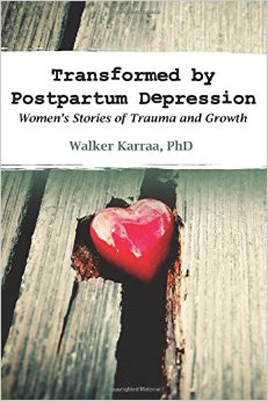Book Review - Transformed by Postpartum Depression: Women's Stories of Trauma and Growth, Part One
By: Sharon Muza, BS, LCCE, FACCE, CD/BDT(DONA), CLE | 0 Comments
By Cynthia Good Mojab, MS, LMHCA, IBCLC, RLC, CATSM

Walker Karraa, PhD, a former contributor to Science & Sensibility, has authored a new book, Transformed by Postpartum Depression: Women's Stories of Trauma and Growth, that speaks to what lies on the other side for the 20 women she interviewed about their experiences with postpartum depression. Cynthia Good Mojab, MS, LMHCA, IBCLC, RLC, CATSM, who specializes in supporting people with postpartum mood and anxiety disorders and birth trauma presents a three-part series related to Dr. Karraa's book. Today on the blog, Cynthia outlines the books content and its implications for practice. On Thursday, Cynthia shares her commentary on some of Dr. Karraa's research and conclusions. Next week we are offered a glimpse into the person behind the book, when an interview with Dr. Karraa is shared with blog readers. Follow all three parts of this series on "Transformed by Postpartum Depression." - Sharon Muza, Science & Sensibility Community Manager.
In the last several decades, our awareness and understanding of postpartum depression have steadily increased. A wealth of research now exists regarding its prevalence, risk factors, prevention, symptoms, consequences, and treatment. Organizations, like Postpartum Support International and Postpartum Progress, champion the needs of families touched by postpartum depression and other perinatal mental health challenges, counter stigma, and contribute critical support and information to the safety net that all new families need and deserve. Many states in the United States have enacted legislation or developed projects related to public education, screening, and/or treatment for perinatal mental health challenges. And, at the national level in the US, the 2020 Mom Project seeks to remove institutional barriers that prevent depressed new mothers from being identified and accessing treatment.
In spite of this progress, we do not see the prevalence of postpartum depression dropping. Globally, it is as high as 82.1% when measured using self-reported questionnaires and as high as 26.3% when measured using structured clinical interviews (Norhayati, Nik Hazlina, Asrenee, & Wan Emilin, 2014). In fact, we see that depression during pregnancy and after birth routinely goes undetected and untreated (Miller et al., 2012). How is that possible? And, beyond the statistics that we have now amassed, what is it really like to experience postpartum depression, come out the other side, and make meaning from the experience?
Posttraumatic Growth after Postpartum Depression
In her new book, Transformed by Postpartum Depression: Women's Stories of Trauma and Growth, Walker Karraa, PhD (2014) invites readers to join her in a touching and thought provoking exploration of the potentially transformative nature of postpartum depression. Her book, which is based on the findings of her dissertation research (Karraa, 2013), brings to light both the suffering and development that women can experience on this journey. In fact, her book is one of the fruits of her own transformation through her experience of severe postpartum depression. Parents, lay supporters, and perinatal care providers who appreciate the blend of research and women's voices found in books like Depression in New Mothers: Causes, Consequences, and Treatment Alternatives (Kendall-Tackett, 2010) and Traumatic Childbirth (Beck, Driscoll, & Watson, 2013) will also appreciate Karraa's book. It should certainly be considered "required reading" for perinatal care providers and lay supporters.
 Karraa begins with a brief review of the literature, including what postpartum depression is, who develops it, and its global prevalence, risk factors, and consequences. These facts and figures help orient the reader to the general nature and scope of a veritable global mental health pandemic. They also serve to illustrate the foundation of the dominant discourse regarding postpartum depression: an allopathic worldview that frames mental illness as pathology. The following five chapters, however, contribute to an expansion of that view by illustrating how postpartum depression can be experienced as a long and painful journey culminating in positive change.
Karraa begins with a brief review of the literature, including what postpartum depression is, who develops it, and its global prevalence, risk factors, and consequences. These facts and figures help orient the reader to the general nature and scope of a veritable global mental health pandemic. They also serve to illustrate the foundation of the dominant discourse regarding postpartum depression: an allopathic worldview that frames mental illness as pathology. The following five chapters, however, contribute to an expansion of that view by illustrating how postpartum depression can be experienced as a long and painful journey culminating in positive change.
In the course of conducting her qualitative research, Karraa used grounded theory to analyze the answers of 20 women to four questions (Karraa, 2013) about their experience of postpartum depression:
- How would you describe your process of transformation through postpartum depression?
- In what ways did you experience the process of transformation through postpartum depression?
- What were the ways you saw yourself transforming?
- How do you experience this transformation currently?
She uncovered five stages of transformation through postpartum depression: before, during, ending, after, and beyond. That the women described 1) feeling shocked by the nature and magnitude of their symptoms, 2) enduring physical and psychological disintegration to which care providers seemed oblivious, and 3) slowly finding a path toward recovery will strike a familiar chord for lay supporters, perinatal care providers, and individuals who have worked and/or lived with postpartum depression. What might not be familiar to all readers are the last two stages that Karraa identified: 4) an increase in self-care, self-confidence, authenticity, and compassion; improved relationships; and alteration of perception of self and purpose in the world; and 5) coming to view postpartum depression as resulting - paradoxically - in a profoundly positive transformation.
In her 7th chapter, Karraa gives the reader a thoughtful tour of her consideration of several theories that might explain her research participants' experiences of transformation through postpartum depression. Ultimately, she recognized that the prolonged endurance of threat to their physical and psychological survival was so great that the women experienced postpartum depression as a traumatic life event and that the transformative nature of their experience of postpartum depression is, thus, an example of posttraumatic growth: "positive psychological change experienced as a result of the struggle with highly challenging life circumstances" (Tedeschi & Calhoun, 2004).
In chapter 8, Karraa shares the confirming feedback of four experts in the field of postpartum depression, including the illustrious Cheryl Tatano Beck, Jane Shakespeare-Finch, Karen Kleinman, and Jane Honikman. Then she closes with a chapter acknowledging that her work has revealed a connection that has been right under our noses waiting for us to formally notice and describe: postpartum depression is one of the adversities of life that can precipitate growth. Karraa researched, recognized, and named that connection. Naming an experience honors it. It also provides a language for new parents, lay supporters, perinatal care providers, and researchers to use as they seek to express, understand, provide support for, treat, recover from, and/or grow from the life-altering experience of postpartum depression. And, perhaps most importantly, it offers hope to those who are fighting their way back from the devastation of postpartum depression. Not only can recovery be found at the end of the darkest tunnel; transformation may await.
Care Provider Failure: A Call to Action
The power of Karraa's book continues in its appendices, where she describes an informal survey that serves as an(other) urgent call to action for all of us: in spite of the high prevalence of postpartum depression and its negative consequences when untreated, we are collectively failing to help those who are experiencing it. Because so many women in her qualitative study reported that their care providers had failed to help them, Karraa conducted the Changing Depression Survey (n=486). When asked who was most responsible for their getting help for postpartum depression, 65.4% of her participants selected "Self," 23.0% selected "Partner," 16.9% selected "Family Member," 11.7% selected "Medical Care Provider" (which includes OB/GYN, Midwife, General or Family Physician), 8.8% selected "Other (Friend)," and 6.6% selected "Therapist." When asked who was least helpful in getting them help for postpartum depression, 43.2% of her participants selected "Medical Care Provider," 21% reported "Family Members," 20.6% reported "Partner," 19.3% reported "Self," and 6.8% reported "Therapist."
While this is, admittedly, an informal survey, the patterns seen here match clinical experience as well as research findings that only a fraction of new mothers with postpartum depression are identified and treated (Milgrom & Gemmill, 2014). My own clients, who are new parents, frequently report finding me after seeing a series of care providers who did not formally screen or refer them for perinatal mental health challenges, did not informally ask them about how they are coping with new parenthood, and/or did not respond with sensitivity, validation, or assistance when they tried to share their struggles. A delay in diagnosis, support, and treatment can both worsen and prolong suffering for new parents struggling through postpartum depression. Karraa's research suggests that, in some cases, it may also delay the experience of posttraumatic growth.
This call to action must be heard and effectively responded to by individuals as well as by institutions. Yes, perinatal care providers and lay supporters will benefit from reading Karraa's book. But, reading the book is not the same as developing the skills to apply the book's insights in practice. Her research is an invitation for organizations and credentialing institutions in the diverse fields that provide services to new families (e.g., childbirth education, doula care, midwifery, obstetrics, pediatrics, family practice medicine, lactation education, lactation consulting, counseling, social work, psychiatry, naturopathic medicine) to develop, offer, and require training related to perinatal mental health, including:
- how to reduce stigma and increase awareness by educating expectant and new parents about perinatal mental health issues
- why, when, and how to screen and refer
- how to effectively provide care to new parents struggling with perinatal mental health challenges - including using approaches that incorporate an understanding of postpartum depression as potential transformation to be nurtured, not just as pathological symptoms to be eliminated.
Conclusion
Transformed by Postpartum Depression: Women's Stories of Trauma and Growth consistently engages the reader with the poignant and inspiring stories of 20 women, as well as with the intriguing insights of the author and four experts in the field. The moving narratives and cogent analysis effectively describe the women's experience of postpartum depression as traumatic and the transformation of their suffering into growth. The book also invites us to transcend the dominant view of postpartum depression as pure pathology and to learn how to take effective action to keep new parents struggling with perinatal mental health challenges from falling through the cracks. I congratulate Dr. Karraa on authoring a book that makes such a meaningful contribution to our understanding of postpartum depression and, refreshingly, offers a significant focus on recovery and development. Join me here on this blog on Thursday to read my commentary regarding frameworks that might explain her findings as well as my hopes for future research.
References
Beck, C., Driscoll, J., & Watson, S. (2013). Traumatic Childbirth. New York: Routledge.
Karraa, W. (2013). Changing Depression: A Grounded Theory of the Transformational Dimension of Postpartum Depression. (Doctoral dissertation). Retrieved from ProQuest/UMI. (3607747.)
Karraa, W. (2014). Transformed by Postpartum Depression: Women's Stories of Trauma and Growth. Amarillo, TX: Praeclarus Press.
Kendall-Tackett, K. (2010). Depression in New Mothers: Causes, Consequences, and Treatment Alternatives. New York: Routledge.
Milgrom, J. & Gemmill, A. (2014). Screening for perinatal depression. Best Practice & Research Clinical Obstetrics & Gynaecology, 28(1), 13-23.
Miller, L., McGlynn, A., Suberlak, K., Rubin, L., Miller, M., & Pirec, V. (2012). Now What? Effects of On-Site Assessment on Treatment Entry After Perinatal Depression Screening. Journal of Women's Health, 21(10), 1046-1052.
Norhayati, M., Nik Hazlina, N., Asrenee, A., & Wan Emilin, W. (2014). Magnitude and risk factors for postpartum symptoms: A literature review. Journal of Affective Disorders, 175C, 34-52.
Tedeschi, R. & Calhoun, L. (2004). Posttraumatic growth: Conceptual foundations and empirical evidence. Psychological Inquiry, 15(1), 1-18.
About Cynthia Good Mojab

Cynthia Good Mojab, MS Clinical Psychology, is a Clinical Counselor, International Board Certified Lactation Consultant, author, award-winning researcher, and internationally recognized speaker. She is the Director of LifeCircle Counseling and Consulting, LLC where she specializes in providing perinatal mental health care. Cynthia is Certified in Acute Traumatic Stress Management and is a member of the American Academy of Experts in Traumatic Stress and the National Center for Crisis Management. Her areas of focus include perinatal loss, grief, depression, anxiety, and trauma; lactational psychology; cultural competence; and social justice. She has authored, contributed to, and provided editorial review of numerous publications. Cynthia can be reached through her website.
Published: March 09, 2015
Tags
Postpartum depressionPostpartumMental HealthBook ReviewMaternal Infant CareBabiesWalker KarraaPPMADChild SafetydepressionCynthia Good MojabTransformed By Postpartum Depression